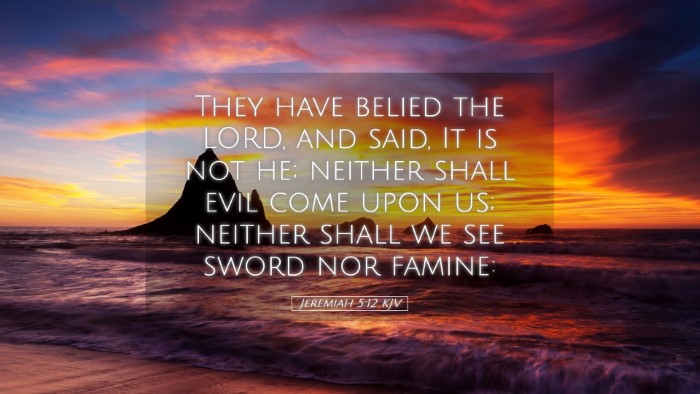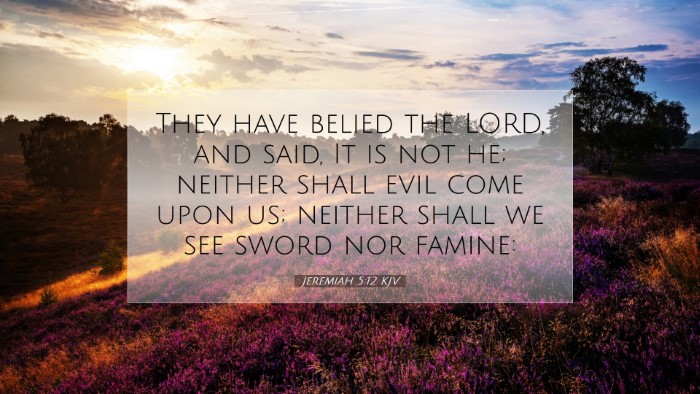Commentary on Jeremiah 5:12
Jeremiah 5:12 states, "They have lied about the Lord and said, 'It is not he; neither will harm come to us; we will never see sword or famine.'" This passage reflects profound themes of denial, disobedience, and divine judgment. Below are insights gathered from various public domain commentaries, providing a deep understanding of this scripture for pastors, students, theologians, and Bible scholars.
Contextual Background
The Book of Jeremiah is primarily a prophetic text that addresses the moral and spiritual decline of Judah prior to the Babylonian exile. The admonitions of the prophet emphasize the consequences of abandoning God’s covenant, and Jeremiah 5 specifically articulates the rejection of God’s truth by the people.
Key Themes
- Denial of Divine Authority: The people of Judah have openly lied about the Lord. They falsely claimed that God would not intervene in their lives, either to judge or to protect.
- False Security: The assertion that “neither will harm come to us” reveals their misguided belief in their own safety, despite their persistent sinfulness.
- Prophetic Rejection: This verse represents a critical point in Jeremiah’s ministry where the prophet confronts the complacency of the people towards impending judgment.
Insights from Commentaries
Matthew Henry
Matthew Henry observes that the sins of the people involved a fundamental misunderstanding of God's nature and a blatant disregard for His words. He emphasizes that their lies stemmed from a deep-seated desire to reject accountability. Henry highlights that such falsehoods lead to spiritual blindness, claiming security without repenting of sin.
Albert Barnes
Albert Barnes elaborates on the implications of the people's denial, noting that their assertions were not merely verbal but indicative of a broader national attitude toward God and His prophetic messages. Barnes draws attention to the irony of their claims of safety, contrasting their human understanding of security with God's impending judgment. He notes that this complacency is often a precursor to disaster, emphasizing that neglecting the warnings of God results in dire consequences.
Adam Clarke
Adam Clarke provides a historical context, explaining that the people believed their past experiences with God’s mercy guaranteed future security without consideration for their disobedience. He argues that this delusion is often perpetuated even in contemporary faith communities, stressing the importance of recognizing the seriousness of sin and the necessity of repentance in light of divine truth.
Application for Today
This verse serves as a poignant reminder to modern believers about the dangers of spiritual complacency and theological misinterpretation. Churches and ministries must remain vigilant against teaching that downplays the necessity of repentance and accountability before God.
Reflection Questions
- What contemporary beliefs might parallel the false reassurances expressed by the people of Judah?
- How can the church today address the theme of false security in its ministry?
- In what ways can believers ensure they remain rooted in the truth of Scripture to avoid deception?
Concluding Thoughts
Jeremiah 5:12 serves as a challenging yet necessary exhortation. As the church confronts modern distractions and false teachings, this passage reminds us of the urgent need for authentic spirituality grounded in truth, accountability, and the fear of the Lord. As scholars and leaders reflect upon this scripture, may they inspire congregations to embrace genuine faithfulness rather than complacent certainties.


